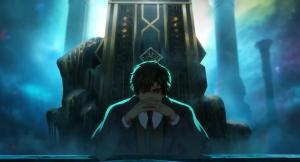SSSS.Gridman has quickly become one of the best anime series of the fall, a quirky and fun series that mixes slice of life banality with giant robots and kaiju. But it’s somewhat of a surprise given the series’ origins.
Videos by ComicBook.com
Last year, Tsuburaya Productions announced they were rebooting Gridman the Hyper Agent into an anime series. Gridman was one of dozens of tokusatsu series released in Japan in the early to mid 1990s and re-packaged in the United States in the wake of the success of Mighty Morphin Power Rangers.
Many were a bit confused by the decision to adapt Gridman into an anime, as the series was merely a footnote in the tokusatsu genre, a TV show that lasted only two seasons in both Japan and the US. In Japan, Gridman was eclipsed in popularity by Tsuburaya Productions’s Ultraman, while the US’s version (titled Superhuman Samurai Syber-Squad) was notable only for its surprising faithfulness to the original source material and having Matthew Lawrence (of Boy Meets World fame) as its star.
However, anime viewers quickly realized there was something different about SSSS.Gridman when the first episode debuted in early October. The premise of SSSS.Gridman was a tweaked version of the original series — three teens find themselves allied with a mysterious digital entity named Gridman in a fight to stop kaiju from wrecking their series. Their enemy is secretly a classmate of theirs, manipulated by another virtual creature into pursuing petty grudges with killer monsters.
However, the similarities mostly end there. While SSSS.Gridman has all the giant robot vs. monster fights you’d expect from a tokusatsu adaptation, what really sets it apart is its surprisingly nuanced characters and the series’ desire to explore their lives.

At the heart of SSSS.Gridman are the complicated lives of Yūta Hibiki and Rikka Takarada. The series opens with Yūta waking up in Rikka’s apartment and quickly discovering he has amnesia. While Rikka is seemingly frustrated by Yūta’s memory loss, she reluctantly agrees to help him and Gridman… in part because the computer that stores Gridman is located in her family’s junk shop.
Rikka is the emotional core of the series. She is a girl understandably traumatized by watching her city be destroyed and friends threatened over and over again. What’s worse, she, Yūta and fellow Gridman ally Shō Utsumi are apparently the only ones who can remember the frequent kaiju attacks and their victims. After each attack, the city is seemingly reset the next day, with anyone killed in the attacks forgotten or erased from history.
In the second episode, Rikka is devastated to learn that members of the volleyball team were killed and seemingly erased from their class due to a kaiju attack. While she wasn’t close with the girls, she’s horrified at the thought that she’ll be the only one to remember them and their times growing up together. It’s a heavy burden for any teenager to bear, and it plays into the melancholy that separates the series from other shonen anime.
Yūta mostly plays the role of your standard hero, but he also struggles with the sudden situation he finds himself in. As Gridman, Yūta refuses to attack a kaiju because he thinks it might be a transformed human. He’s also continually frustrated by his lingering amnesia, especially in how it impacts his friendship with Rikka. Yūta thinks that there might be something between him and Rikka, but he’s confused by her hot-and-cold attitude towards him. At times, she seems caring and concerned for his safety, but other times she can’t wait to get away from him, and it all might have something to do with whatever happened before Yūta’s memory loss. It’s a complicated relationship, far more nuanced than what you might expect out of a series whose focus seems to be giant robots kicking the snot out of massive kaiju.

It’s not just a complicated relationship that makes SSSS.Gridman unique. The series also commits to exploring the struggle to maintain some level of “normal” in an increasingly crazy world. While the “crazy world” in SSSS.Gridman features kaiju and robot warriors, the hardships and emotional tolls are extremely relatable to many who read today’s news and wonder how everything spiraled out of control so quickly.
SSSS.Gridman shows this by emphasizing much of the mundanity of their main character’s lives. Sure, every episode features a big Gridman vs. kaiju showdown, but most of the show focuses on how Yūta, Rikka, and Shō juggle their everyday lives with their responsibilities to Gridman. Their school is a bit of a dump, their lives are mostly uninteresting when not fighting giant monsters, and they spend their time balancing the supernatural with just trying to exist and spend time with their friends. The mundanity adds a “slice of life” aspect to SSSS.Gridman, one not usually featured in shonen anime series.
What’s more, even the more extreme characters of the show get sucked into the unexciting parts of the show too. A recent episode, for instance, featured the extra-normal Neon Genesis Junior High Students allies (strange warriors who can transform into vehicles to help Gridman in his fight against the kaiju) helping Yūta with his crush on Rikka. Sure, the situation is played mostly for laughs, but there’s also earnest feelings at play here, with one character gently advising Yūta on approaching Rikka and getting his feelings out in the open. Even Gridman offers to help Yūta, comparing Yūta’s complicated feelings to the kaiju they face together.
In a way, SSSS.Gridman feels like an attempt to bring a shonen concept into the real world. There’s very little internal monologue providing windows into the characters’ thoughts, nor is there much exposition to help clue viewers on what is going on. Plus, background music is used very deliberately and never when the show is focusing on the characters’ normal lives. And director Akira Amemiya also chooses interesting shots that focus on setting or non-facial cues rather than the characters themselves. Watching a conversation play out as the camera focuses on someone absent mindedly fidgeting with their feet, or with their backs turned and facing a skyline of the city gives SSSS.Gridman a very cinematic feel, a deliberate departure from other shows in the genre.
Of course, there’s also all the Easter eggs and references to different series. Not only are their plenty of nods to the original Gridman series, there are a ton of references to the Transformers franchise too. Almost all of the characters contain subtle nods to different Transformers toys and characters, which is both fascinating and delightful. Akira Amemiya, the director of SSSS.Gridman, is a huge Transformers fan, so it seems that these are just fun Easter eggs, but it’s a blast to see what obscure Transformer he’ll pull out next.
SSSS.Gridman is one of the best anime series of 2018, a show that combines the explosive action of kaiju fights with the mundanity of real life while a strangely frightening mystery plays out in the background. We can’t wait to see where SSSS.Gridman goes next, and hope the anime sticks around for a long time.









